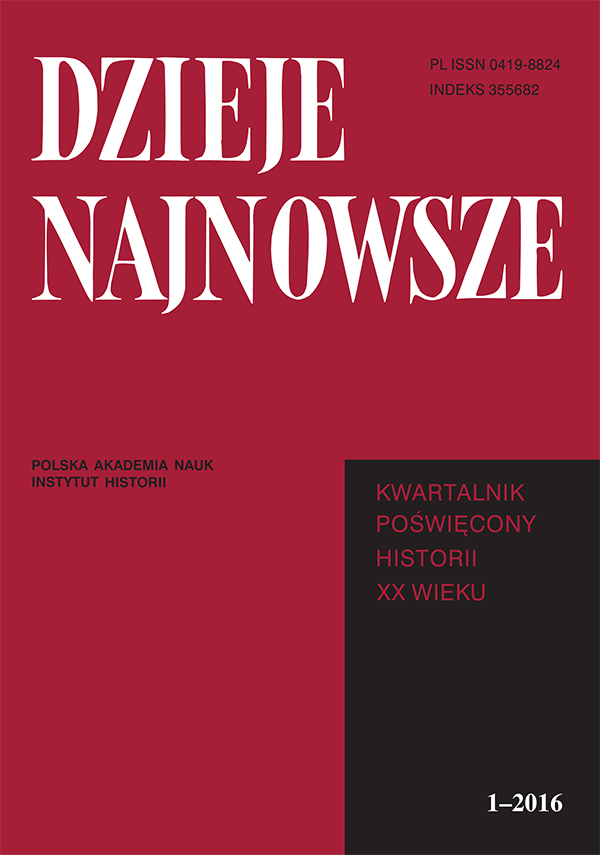Polskie problemy z genocydem Rafała Lemkina
DOI:
https://doi.org/10.12775/DN.2016.1.01Palabras clave
Lemkin, genocyd, etnocyd, Konwencja o zapobieganiu i karaniu zbrodni ludobójstwa, UPA, Jugosławia, KatyńResumen
Polish Problems with Genocide According to Rafał Lemkin
Rafał (Raphael) Lemkin is currently the best–known Polish lawyer, whose name appears invariably as a point of departure for international discussions about genocide. He is the author of The German New Order in Poland and in 1944 published Axis Rule in Occupied Europe, containing the term: “genocide”. At the time of the Nuremberg Trial Lemkin acted as adviser to United States Supreme Court Justice Robert H. Jackson. Subsequently, he worked on devising an act of law that would define the principles of penalising the crime of genocide. On 9 December 1948 the United Nations General Assembly adopted the Convention on the Prevention and Punishment of the Crime of Genocide. In Poland the revival of interest in Lemkin has its positive and negative sides. The former undoubtedly include changing or rather initiating an alteration of a situation embarrassing or outright insulting for Poland, namely, when Polish–language versions of the above–mentioned books about the Axis occupation were not available and Lemkin was not mentioned in assorted studies. The latter aspect involves his sui generis sacralisation and elevation, hindering a critical discussion about his achievements, since such a debate could be interpreted as questioning them. This article endeavours to examine the conception of genocide from the viewpoint of an historian, and reflects on the extent to which it could become an instrument of historical analysis.Citas
Basak A., Zbrodnia Katyńska w świetle koncepcji Rafała Lemkina oraz prac przygotowawczych do konwencji o ludobójstwie, w: Zbrodnia Katyńska. Kryzys prawdy 1940–2010, Warszawa 2005, s. 115–131.
Chalk F., Jonassohn K., Genozid — Ein historischer Überblick, w: Genozid und Moderne, red. M. Debag, Opladen 1998, s. 294–308.
Cooper J., Raphael Lemkin and the Struggle for the Genocide Convention, Basingstoke 2008.
Hinton A. L., Critical Genocide Studies, „Genocide Studies and Prevention” 2012, nr 7:1, s. 4–15.
Johnson R., Leighton P. S., Black Genocide? Preliminary Thoughts on the Plight of America’s Poor Black Men, „Journal of African American Men” 1995, nr 1/2, s. 3–21.
Kornat M., Barbarzyństwo — wandalizm — terroryzm — ludobójstwo. O Rafale Lemkinie i idei zdefiniowania „zbrodni w obliczu prawa narodów”, „Polski Przegląd Dyplomatyczny” 2008, nr 3(43), s. 79–100.
Kornat M., Rafał Lemkin (1900–1959) — stadium biograficzne, „Zeszyty Historyczne” 2004, s. 107–157.
Lemkin R., Rządy państw Osi w okupowanej Europie, Warszawa 2013.
Nijakowski L. M., Rozkosz zemsty. Socjologia historyczna mobilizacji ludobójczej, Warszawa 2013.
Panné Jean–Louis, Rafał Lemkin, czyli potęga bezsilności, „Polski Przegląd Dyplomatyczny” 2008, nr 3(43), s. 19–66.
Schaller D., From Lemkin to Clooney: The development and state of studies, „Genocide Studies and Prevention” 2011, nr 3, s. 245–256.
Spychalska A., Rafał Lemkin — twórca pojęcia „ludobójstwo”, „Acta Erasmiana” 2012, z. II, s. 157–171.
Szawłowski R., Rafał Lemkin (1900–1959). Polski prawnik twórcą pojęcia „ludobójstwo”, „Sprawy Międzynarodowe” 2005, nr 2(LVIII), s. 103–138.
Weiss–Wendt A., Zakładnik polityki. Rafał Lemkin o „sowieckim ludobójstwie”, „Polski Przegląd Dyplomatyczny” 2008, nr 3(43), s. 67–78.
Żukowski P. M., Krakowskie czasy studiów Rafała Lemkina, „Dzieje Najnowsze” 2011, r. XLIII, z. 1, s. 139–158.
Descargas
Publicado
Cómo citar
Número
Sección
Stats
Number of views and downloads: 1025
Number of citations: 0



